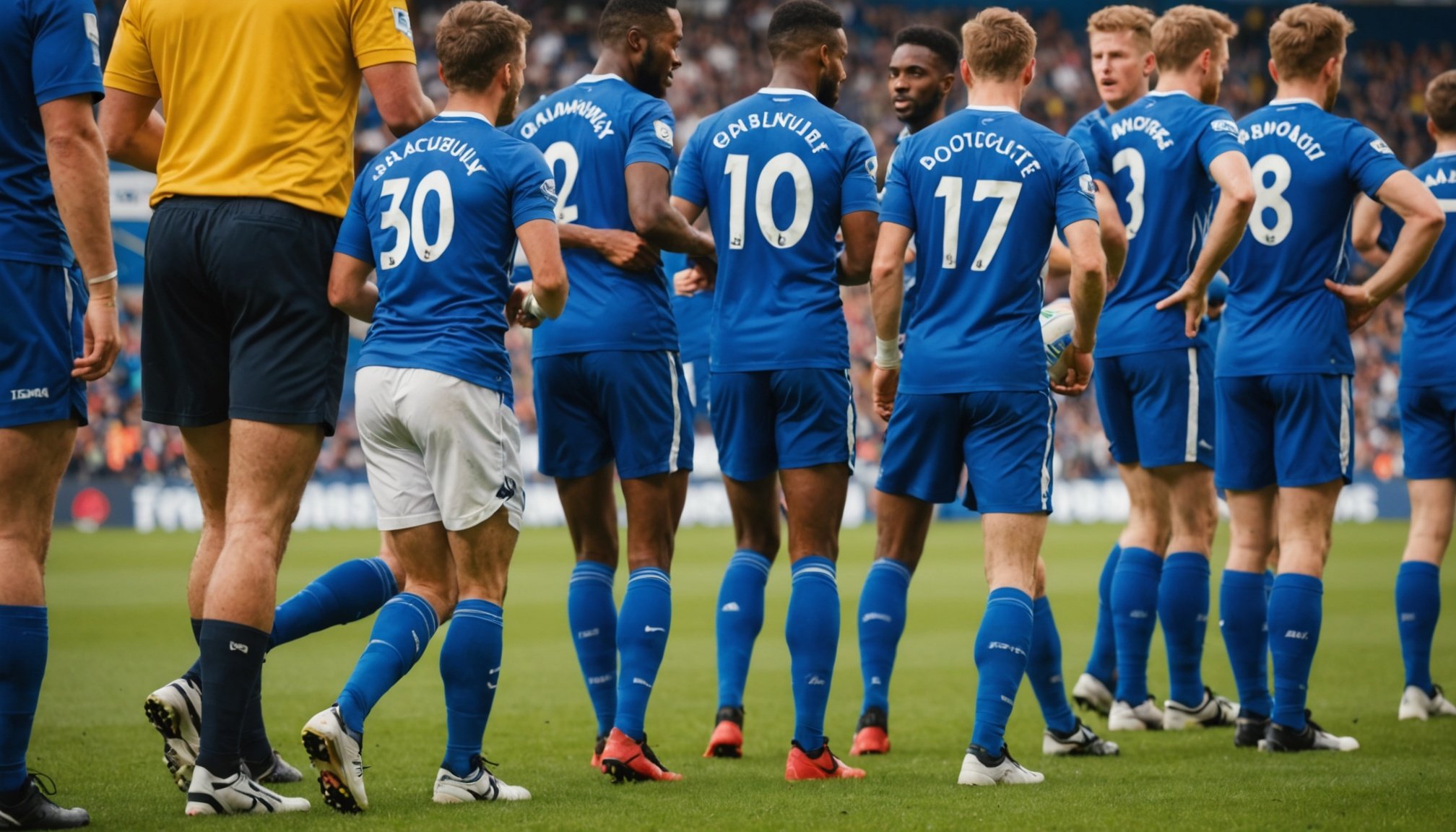Ultimate Guide: Top Strategies for UK Sports Clubs to Maximize Sponsorship Success
Understanding the Landscape of Sports Sponsorship
In the UK, sports sponsorship is a vital component of a sports club’s financial and strategic planning. With the ever-increasing costs of maintaining a competitive team, securing sponsorship deals has become more crucial than ever. Here’s a deep dive into the current landscape and how UK sports clubs can maximize their sponsorship success.
The Importance of Sponsorship for Sports Clubs
Sponsorship is not just about securing financial support; it’s also about building a strong brand identity and engaging with the community. For a football club, for instance, having the right sponsors can elevate its profile, attract new fans, and provide the necessary resources to compete at the highest level.
In the same genre : Top Strategies for UK Sports Teams to Boost Mental Toughness and Resilience
“Securing sponsorship is a key part of our strategy to ensure the long-term sustainability of our club,” says Jane Smith, Marketing Director of a Premier League football club. “It allows us to invest in our team, facilities, and community programs, which are essential for our growth and success.”
Identifying and Targeting Potential Sponsors
To maximize sponsorship success, it’s essential to identify and target the right potential sponsors. Here are some strategies to help you do so:
Have you seen this : Exploring the Cutting-Edge Sustainable Techniques for UK Sports Turf Management
Understanding Your Target Audience
Before approaching potential sponsors, it’s crucial to understand your target audience. Who are your fans? What are their demographics, interests, and behaviors? This information will help you tailor your sponsorship proposal to appeal to the right brands.
For example, if your football club has a strong following among families, you might target brands that cater to this demographic, such as family-friendly restaurants or children’s clothing brands.
Building a Strong Brand Identity
A strong brand identity is key to attracting sponsors. Your brand should reflect the values, mission, and unique selling points of your club. This includes your logo, website, social media presence, and overall messaging.
“A well-defined brand identity makes it easier for sponsors to see how they can align their brand with ours,” explains John Doe, CEO of a grassroots football club. “It shows that we are professional, organized, and committed to our values.”
Creating a Compelling Sponsorship Proposal
Your sponsorship proposal should be clear, concise, and compelling. Here are some key elements to include:
- Executive Summary: A brief overview of your club, its achievements, and why you are seeking sponsorship.
- Market Analysis: An analysis of your target audience and how it aligns with the potential sponsor’s target market.
- Sponsorship Packages: Detailed packages outlining what sponsors will receive in return for their support, such as naming rights, event sponsorship, and media exposure.
- Case Studies: Examples of successful sponsorship deals and their impact on both the club and the sponsor.
- Financial Projections: Clear financial projections and a breakdown of how the sponsorship funds will be used.
Effective Sponsorship Activation and Engagement
Once you’ve secured a sponsorship deal, it’s crucial to activate and engage with your sponsors effectively. Here are some strategies to ensure you get the most out of your sponsorship:
Leveraging Social Media
Social media is a powerful tool for engaging with your audience and sponsors. Use platforms like Twitter, Instagram, and Facebook to share updates, behind-the-scenes content, and sponsor-related posts.
“For us, social media is a key channel to engage with our sponsors and fans,” says Sarah Johnson, Social Media Manager of a football club. “We ensure that our sponsors are regularly mentioned and thanked across our platforms.”
Hosting Sponsor-Focused Events
Hosting events that cater specifically to your sponsors can help build strong relationships and demonstrate the value of the sponsorship. This could include exclusive match-day hospitality, sponsor-only events, or community outreach programs.
“Our annual sponsor appreciation event is a highlight of our calendar,” notes Michael Brown, Commercial Director of a sports club. “It allows us to thank our sponsors in person and show them the impact of their support.”
Utilizing Naming Rights and Brand Visibility
Naming rights and brand visibility are significant benefits that sponsors look for in a sponsorship deal. Ensure that your sponsors’ brands are prominently displayed across your facilities, marketing materials, and media channels.
“Our stadium naming rights deal with XYZ Corporation has been a game-changer,” says Emily Davis, Marketing Manager of a sports club. “It not only provides financial support but also enhances our brand visibility and credibility.”
Building Long-Term Relationships with Sponsors
Building long-term relationships with sponsors is crucial for sustained success. Here are some tips to help you foster these relationships:
Regular Communication
Regular communication is key to maintaining a healthy relationship with your sponsors. Keep them updated on the club’s performance, upcoming events, and any changes or successes.
“We have a monthly newsletter that goes out to all our sponsors, keeping them informed about what’s happening at the club,” explains Tom Harris, Sponsorship Manager of a football club.
Offering Exclusive Benefits
Offering exclusive benefits to your sponsors can help keep them engaged and satisfied. This could include VIP access to matches, exclusive content, or special discounts.
“Our sponsors love the VIP treatment they receive on match days,” says Laura Lee, Sponsorship Coordinator of a sports club. “It makes them feel valued and appreciated.”
Measuring and Reporting Success
Measuring and reporting the success of your sponsorship deals is essential to demonstrating value to your sponsors. Use metrics such as brand exposure, social media engagement, and event attendance to show the impact of the sponsorship.
“We provide detailed reports to our sponsors after each event, showing how their brand was exposed and the engagement we received,” notes David Martin, Analytics Manager of a sports club.
Comparative Analysis: UK vs. Other European Countries
When it comes to sports sponsorship, the UK is often compared to other European countries. Here’s a comparative analysis to see where the UK stands:
| Country | Annual Sports Sponsorship Budget | Key Sectors | Notable Initiatives |
|---|---|---|---|
| UK | £1.5 billion | Football, Rugby, Cricket | Premier League sponsorship deals, Rugby World Cup sponsorships |
| Germany | €2.5 billion | Football, Formula 1 | Bundesliga sponsorship deals, Formula 1 team sponsorships |
| France | €1.2 billion | Football, Cycling | Ligue 1 sponsorship deals, Tour de France sponsorships |
| Italy | €1 billion | Football, Formula 1 | Serie A sponsorship deals, Formula 1 team sponsorships |
As seen in the table, the UK has a significant sports sponsorship budget, but it lags behind some European counterparts in terms of overall investment. However, the UK’s Premier League is one of the most lucrative sports leagues globally, attracting substantial sponsorship deals.
Real-Life Examples and Success Stories
Here are some real-life examples and success stories of UK sports clubs that have maximized their sponsorship success:
Manchester United and Chevrolet
Manchester United’s sponsorship deal with Chevrolet is one of the most notable in the Premier League. The seven-year deal, worth around £53 million per year, has been highly successful for both parties. Chevrolet has seen significant brand exposure through Manchester United’s global fan base, while the club has benefited from the substantial financial support.
Leicester City and King Power
Leicester City’s partnership with King Power has been instrumental in the club’s success. The naming rights deal for the King Power Stadium, along with various other sponsorship packages, has provided the club with the financial resources to compete at the top level.
Practical Insights and Actionable Advice
Here are some practical insights and actionable advice for UK sports clubs looking to maximize their sponsorship success:
Diversify Your Sponsorship Portfolio
- Diversify your sponsors: Don’t rely on a single sponsor. Having a diverse portfolio of sponsors can help mitigate financial risks and provide multiple revenue streams.
- Explore different sectors: Look beyond traditional sports sponsors. Consider brands from various sectors that align with your club’s values and target audience.
Engage with Your Community
- Community outreach: Engage in community outreach programs that involve your sponsors. This can help build a stronger connection between the club, the sponsors, and the community.
- Fan engagement: Keep your fans engaged through social media, events, and other initiatives. Happy fans mean more value for your sponsors.
Leverage Media and Social Media
- Media partnerships: Build strong relationships with local and national media outlets to increase your club’s visibility and attract more sponsors.
- Social media campaigns: Run targeted social media campaigns to engage with your audience and promote your sponsors.
Maximizing sponsorship success for UK sports clubs requires a multifaceted approach that includes identifying and targeting the right sponsors, building a strong brand identity, effectively activating and engaging with sponsors, and fostering long-term relationships. By understanding the landscape of sports sponsorship, leveraging social media and media channels, and engaging with the community, clubs can secure and retain valuable sponsorship deals.
As the sports sponsorship landscape continues to evolve, UK sports clubs must remain adaptable and innovative in their approaches to attract and retain sponsors. By following the strategies outlined in this guide, clubs can ensure they are well-positioned to secure the sponsorship they need to thrive.
Additional Resources
For further reading and resources, here are some additional tips and tools:
Detailed Checklist for Creating a Sponsorship Proposal
- Research potential sponsors: Identify brands that align with your club’s values and target audience.
- Develop a unique value proposition: Clearly outline what sponsors will receive in return for their support.
- Include case studies and testimonials: Provide examples of successful sponsorship deals and feedback from previous sponsors.
- Offer flexible sponsorship packages: Tailor packages to meet the different needs and budgets of potential sponsors.
- Follow up: Ensure regular communication with potential sponsors to keep them engaged and informed.
Table: Key Metrics for Measuring Sponsorship Success
| Metric | Description | Example |
|---|---|---|
| Brand Exposure | Number of times the sponsor’s brand is visible during events or on media. | 10,000 impressions during a match. |
| Social Media Engagement | Likes, shares, comments on social media posts related to the sponsor. | 500 likes and 100 shares on a single post. |
| Event Attendance | Number of people attending events where the sponsor is promoted. | 20,000 attendees at a sponsored event. |
| Website Traffic | Increase in website traffic due to sponsorship-related content. | 30% increase in website traffic during the sponsorship period. |
| Sales Impact | Increase in sales of the sponsor’s products or services. | 15% increase in sales during the sponsorship period. |
By using these metrics, you can provide a clear and compelling report to your sponsors, demonstrating the value of their investment.
In conclusion, maximizing sponsorship success for UK sports clubs is a complex but rewarding process. By understanding the landscape, targeting the right sponsors, building strong relationships, and leveraging media and social media, clubs can secure the financial and strategic support they need to thrive. Remember, effective sponsorship is about more than just securing funds; it’s about building a strong brand, engaging with your community, and creating lasting partnerships.






